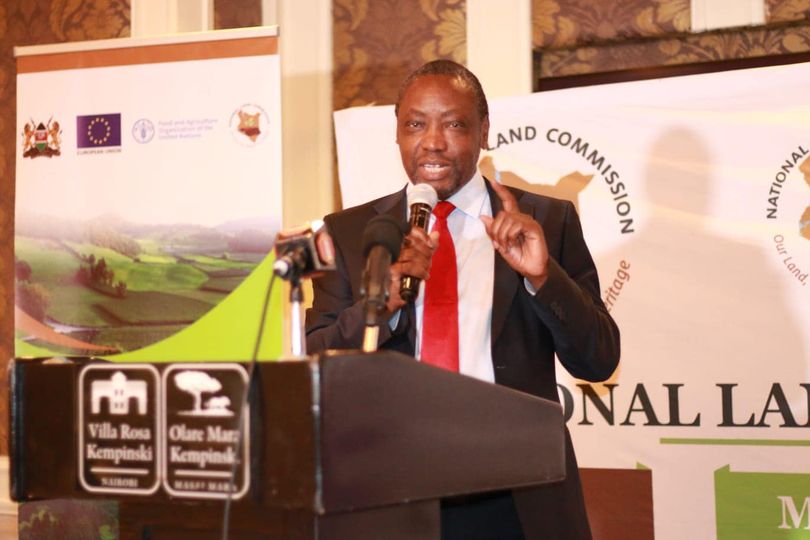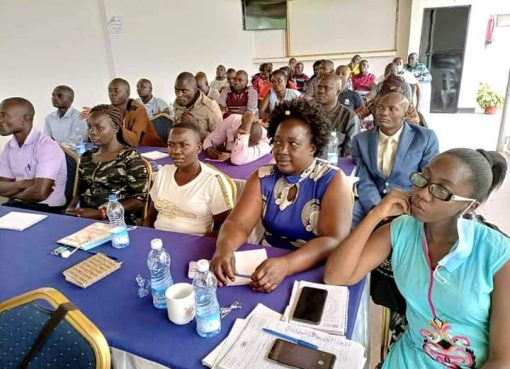The National Land Commission (NLC) has launched its Investigation and Inquiry Practitioners Guide book which gives the commission powers to conduct independent investigations, a move which is geared towards timely resolution of land disputes.
NLC chairman Gershom Otachi said that the guide includes objectives, methods, and procedures to support structures that effectively detect the underlying causes of the dispute, gather evidence, and produce investigation reports.
Otachi speaking in Nairobi on Friday during the launch of the guide book said that the reports shall support litigation, prosecution, inquiries, policy direction, and any other appropriate responses.
“Article 67(2) (e) of the Constitution of Kenya (COK) mandates NLC to initiate investigations, on its initiative or a complaint, into present or historical land injustices, and recommend appropriate redress,” said Otachi.
The chairman explained that Article 67(2) (f) of the COK mandates the NLC to encourage the application of traditional dispute resolution mechanisms in land conflicts which form part of their strategies for faster resolution of land cases.
“The Commission has the powers necessary for conciliation, mediation and negotiation, and may perform any functions and exercise any powers prescribed by legislation, in addition to the functions and powers conferred by the Constitution,” said Otachi.

He explained that investigation in land management involves neutral evaluation of the technical planning, survey, allocation, leasing, titling, acquisition, vesting, and use of land.
“The guide is written in the context of emerging technological, legal, political, social and economic, national, regional and global issues. It is in line with the Kenya Vision 2030 which aims to create “a globally competitive and prosperous country with a high quality of life by 2030,” said the chairman.
Otachi highlighted that poorly investigated or uninvestigated land complaints cost Kenyans and the government huge direct and indirect losses. The losses include expensive litigation, losses in litigation, public land losses, environmental degradation, adverse conflicts, and related socio-economic adverse impacts.
“The guide supports effective neutral evaluation of site findings, land records, technical documents, and witness evidence to ensure success in court and out-of-court settlement processes. Consequently, the guide is an enabler for sustainable health, security, and development,” said Otachi.
He said that NLC’s enhanced capacity in exercising its constitutional and legislative investigation and inquiry mandates will enable NLC lawyers in the development of quality evidentiary affidavits to contribute to informed and effective judgments.
“The Environment and Land Court (ELC) judges can be guided by the NLC investigation, inquisitorial and research outcomes as NLC is enjoined as a public land manager and administrator,” said Otachi.
Additionally, Otachi said that NLC is usually enjoined in court or ordered by the courts to facilitate investigation and inquiry processes and to report back to the court. The guide will support the efficient execution of the related court orders.
“The guide will support emerging linked processes such as NLC online dispute resolution automation that can be integrated in its Haki kwa Ground platform,” said the chairman.
Chief Justice (CJ) Martha Koome said that land in Kenya is a precious and often contentious resource as evidenced in the various Land Commissions reports like the Njonjo Land Commission of 1999, and the Ndung’u Land Commission of 2004 among many others.
In a speech read on her behalf by Smokin Wanjala, a Judge of the Supreme Court of Kenya, today, Koome said that these disputes can be complex and emotional as they involve historical injustices, competing claims, and intricate legal issues and this is why the 2010 Constitution established NLC to conclusively address these challenges.
“The guide demystifies intricate land laws and regulations thus ensuring informed decision-making throughout the investigation process. The guide will ensure that investigations are conducted in the highest standards leading to fairer and more efficient resolution of land cases,” said Koome.
The Chief Justice said that NLC stands as a beacon of hope for those whose land rights have been violated, the guardian of equity for those seeking rightful ownership, and the champion of truth for those navigating the often-murky waters of historical injustices.
NLC Vice Chairperson Gertrude Nguku who is also the chair of the Legal Affairs and Dispute Resolution Committee said that currently NLC has registered 9,823 present land injustice claims and the window for receiving present land injustice complaints is not closed.
“NLC has admitted 1037 historical land injustice claims. The claims raise complex issues that require the analysis of the present and repealed legal frameworks to be processed effectively and efficiently,” said Nguku.
She explained that NLC Commissioners and their technical support team require an in-house operational practitioners’ guide on applicable law and effective procedures to gather and process evidence to support court processes, out-of-court settlements, and facilitation of reports as ordered by the court.
“This guide was developed to address that need. The guide anchors the role and linkages of various internal and external actors during the conduct of due diligence to establish factual substantive and procedural elements to resolve land disputes,” said Nguku.
By Joseph Ng’ang’a





